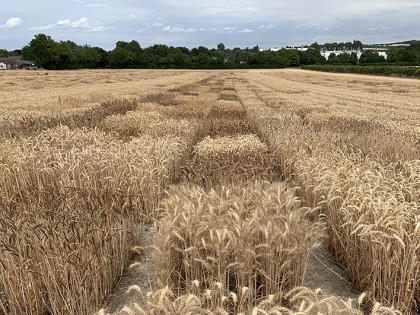United Kingdom
31 Oct 2024

Niab is a partner in a new three-year, international, interdisciplinary research project focused on identifying genetic components that enhance wheat’s capacity to benefit from soil microbes. This initiative aims to improve nutrient uptake, reduce environmental stress, and boost wheat production, especially in low-input farming systems.
The Novo Nordisk Foundation has awarded £5.6 million (DKK 50 million) to the Wheat Alliance project, led by Professor Simona Radutoiu at the Department of Molecular Biology and Genetics at Aarhus University, to harness the potential of plant-microbe interactions for exploring wheat genetics for improved nitrogen and phosphorus uptake and promote sustainable agriculture.
Over a third of all crop yields are lost due to environmental stress factors such as lack of nutrients, drought, flooding, heat, pests, and diseases. There is an increased understanding of the role that the soil microbiome plays in improving a plant’s ability to acquire nutrients and resist environmental stress. Understanding the interactions between microbes and crop plants, such as wheat, thus has the potential to enhance plant performance and resilience.
A large body of knowledge has been obtained from studying symbiotic associations in plants and, more recently, from investigating plant-associated microbial communities. Understanding and predicting functionalities in the plant microbiome is the main area of research for the Collaborative Crop Resilience Program (CCRP), currently funded by the Novo Nordisk Foundation. However, the role of plant genetics in selecting beneficial microbes is largely underexplored.
In the Wheat Alliance project, the four collaborators in CCRP (Aarhus University, Copenhagen University, Utrecht University and North Carolina State University) have teamed up with two UK-based research organisations, Niab and the Crop Science Centre in Cambridge, to investigate how wheat genetics contributes to the selection of a beneficial root microbiome.
Professor Radutoiu explains, “We now have a unique opportunity to bring together the expertise on wheat genetics and the large diversity of wheat genotypes available at Niab with the expertise on beneficial association with beneficial fungi available at the University of Cambridge and the expertise on microbiome analyses and microbiome modelling available at CCRP into one, focused project.”
Modern wheat varieties have been bred to suit today’s agricultural practices based on high input of chemical fertilisers. This means that they may lack the genetic background necessary to optimise the interactions with soil microbes that would enable a more efficient nutrient acquisition. There is a great need to reduce the input of chemical fertilisers in the high-input agricultural systems, but without alternatives in place, the resulting yields will inevitably be lowered.
“By focusing on wheat genetics, the Wheat Alliance project will develop a platform enabling the identification of genetic components that allow plants to optimise their association with beneficial soil microbes, and thus support plant nutrition in a sustainable manner. Via this approach we envision the possibility of harnessing the unexplored genetic capacity of wheat plants to benefit from association with microbes and help secure future crop yields,” says Professor Radutoiu.
Dr Kostya Kanyuka, Head of Plant Pathology at Niab, says: “Our successful wheat pre-breeding and genetics research programmes, including our efforts to introduce novel genetic diversity from wheat’s close relatives into the restricted elite bread wheat gene pool, will underpin this work. Thousands of new wheat lines, including diverse multi-founder experimental populations, are available for genetic analysis in this study.”
Large-scale screenings to reveal constraints in wheat-microbiome interactions
The Wheat Alliance project aims to uncover key constrains in wheat-microbiome interactions by conducting large-scale screenings. Using advanced phenotyping and AI-driven data analysis, we will explore plant and microbial responses to nutrient limitations. Predictive models will help identify wheat genotypes that promote beneficial microbial partnerships for improved growth.
The expected outcomes of the project include the identification of genetic elements in wheat that promote effective interactions with nitrogen- and phosphorus-acquiring soil microbes, the development of predictive models for microbial-driven nutrition, as well as beneficial microbes for development of competitive bioinoculants. These findings will contribute to development of new strategies to pave the way for more resilient and sustainable crop production.
“Our vision is to create a basic framework for microbiome-based breeding that can provide key information to breeders and enable further development and implementation in other crops, or for alleviating other stresses currently managed in agriculture by chemical inputs,” concludes Professor Radutoiu.
The Wheat Alliance project has received £5.6 million (DKK 50 million) over a three-year project period.
This strategic partnership includes:
- Collaborative Crop Resilience Program (CCRP) - https://ccrp.vcl.ncsu.edu/
Department of Molecular Biology and Genetics, Aarhus University, DK
Department of Plant and Environmental Sciences, University of Copenhagen, DK
Plant-Microbe Interactions, University of Utrecht, The NetherlandsNorth Carolina State University, USA
- Niab, Cambridge, UK
- Crop Science Centre (CSC), Plant Sciences Department, University of Cambridge, UK